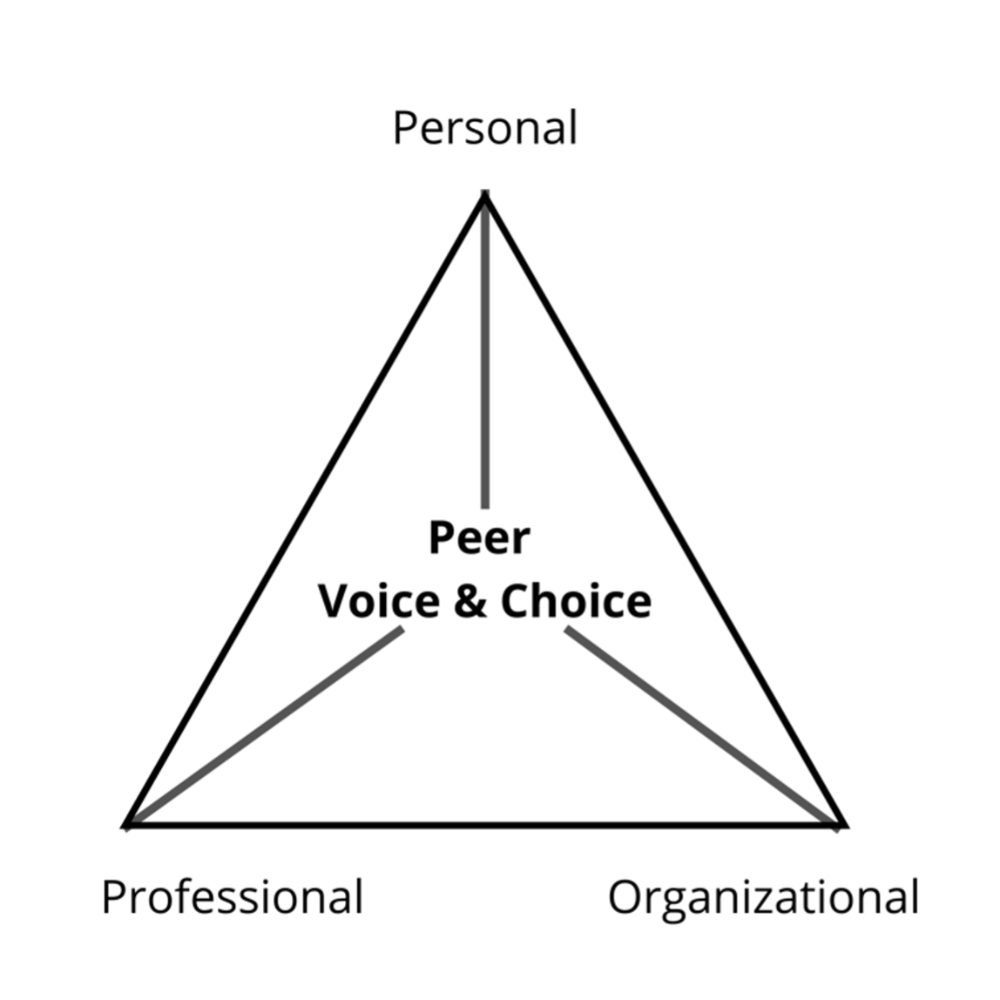Peer Voice & Choice, Personal, Professional, and Organizational
What are the prongs of the ethical decision-making triangle?

Open-ended and closed are forms of this
What is asking questions?
Something that we experience first-hand that is so impactful that it becomes part of our identity
What is lived experience?
This principle recognizes the widespread impact of trauma and emphasizes the importance of creating environments that promote safety, empowerment, and healing, especially for individuals who have experienced adversity
What is trauma-informed?
True or False:
Peer specialists center mutuality and trust with persons served in everything they do
What is TRUE?
Peer specialists can do many different things to support a person, but any action or task should be done with the foundation of mutuality and trust
The wants, needs, and feelings of the person served
What is "peer voice and choice?"
This is the start and end point of the ethical decision-making process.
Taking what someone says and speaking it back to them in a way that aligns with their meaning and feelings
What is reflection?
This peer support tool involves offering personal stories of recovery or challenge to foster connection and inspire hope
What is sharing lived experience?
This principle describes an action or decision that is made by free choice, without coercion, and often driven by personal will or desire rather than obligation
What is voluntary?
True or False:
Peer support is a stepping stone profession for people who want to become therapists or treatment professionals.
What is FALSE?
Peer support is a profession independent of clinical professions (although they can be complementary roles on a team), and it is not a stepping stone for people to go into clinical roles
Agency policies, state laws and regulations, federal laws and regulations, etc.
What is the "organizational" prong?
This technique helps build trust by letting individuals know their thoughts and feelings are understood and accepted without judgment or criticism
What is validation?
The act of building genuine human connections through empathy and shared experiences
What is peer support?
This principle emphasizes the importance of building and maintaining strong connections between individuals, often prioritizing collaboration, trust, and mutual support over task-oriented outcomes
What is relationship-focused?
True or False:
Peer specialists are helpful members of a treatment team because they can get information from a person to share with the team that the person would not otherwise share with their therapist
Confidentiality is foundational to the peer support relationship. Peer specialists should not share things with the treatment team without consent of the person served
Feelings and boundaries of the peer specialist and other people who may be impacted by a situation
What is the "personal" prong?
The act of deeply listening and offering unconditional support to another person without judgment or trying to impact the outcome
What is holding space?
These are the four core tasks of peer support
What are connecting, exploring, supporting, and planning?
This principle refers to the right of individuals or groups to make their own choices and control their own lives without external influence
What is self-determination?
True or False:
Part of the peer support role is being an advocate for things to be done in a more recovery-oriented way
What is TRUE?
Peer specialists are change agents, illuminating the ways that policies and practices need to change to be more recovery-oriented and person-centered
Peer support principles and the Code of Ethics
What is the "professional" prong?
Agreeing or disagreeing to a service or encounter based on full understanding of the situation and risks
What is informed consent?
This three-step process allows peer specialists to understand what a person knows and what they are comfortable with the peer specialist sharing
What is "Ask-Share-Ask?"
The principle that recognizes there are inherent risks in the choices a person makes
What is "dignity of risk"?
True or False:
Peer specialists can support people in finding and connecting to community resources that peer specialists think will help their recovery
What is FALSE?
Peer specialists can support people in finding and connecting to community resources, but they are not gatekeepers and should not put their own opinions onto a person served about what options are helpful or not